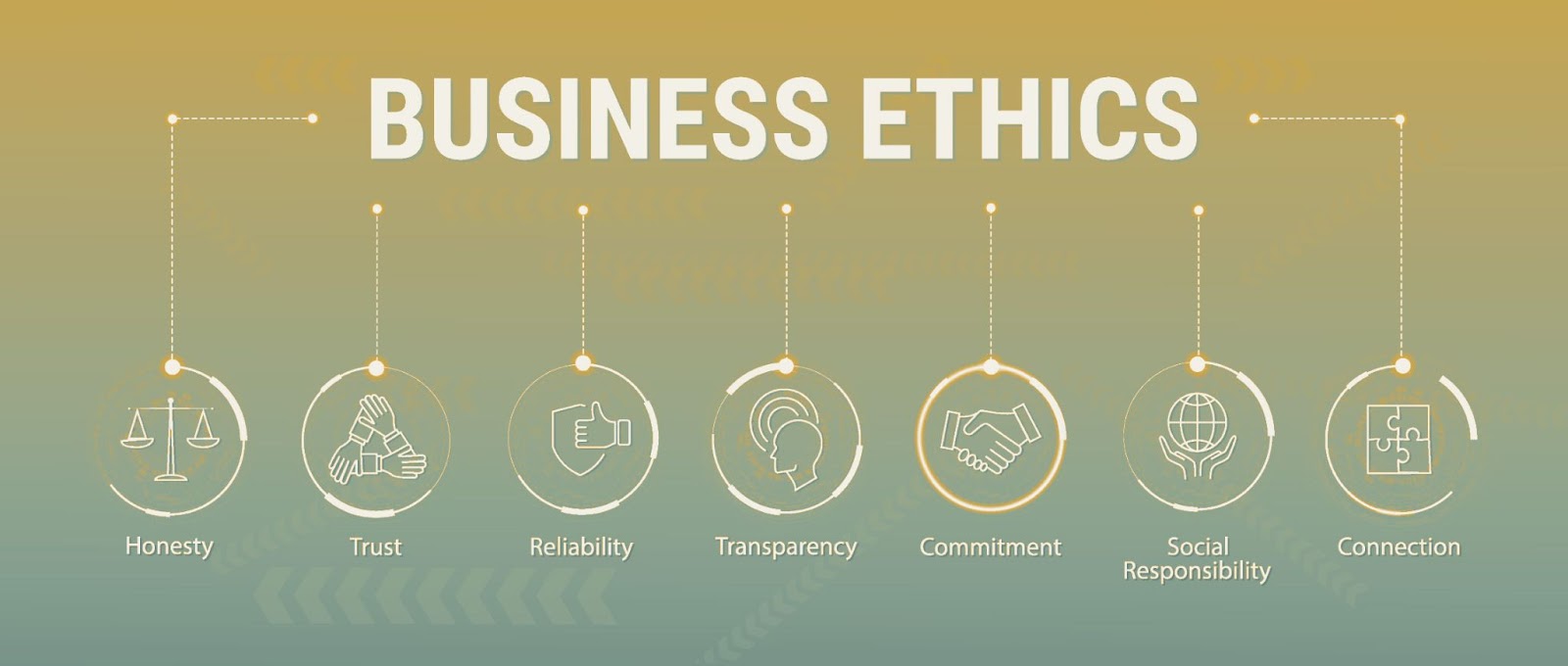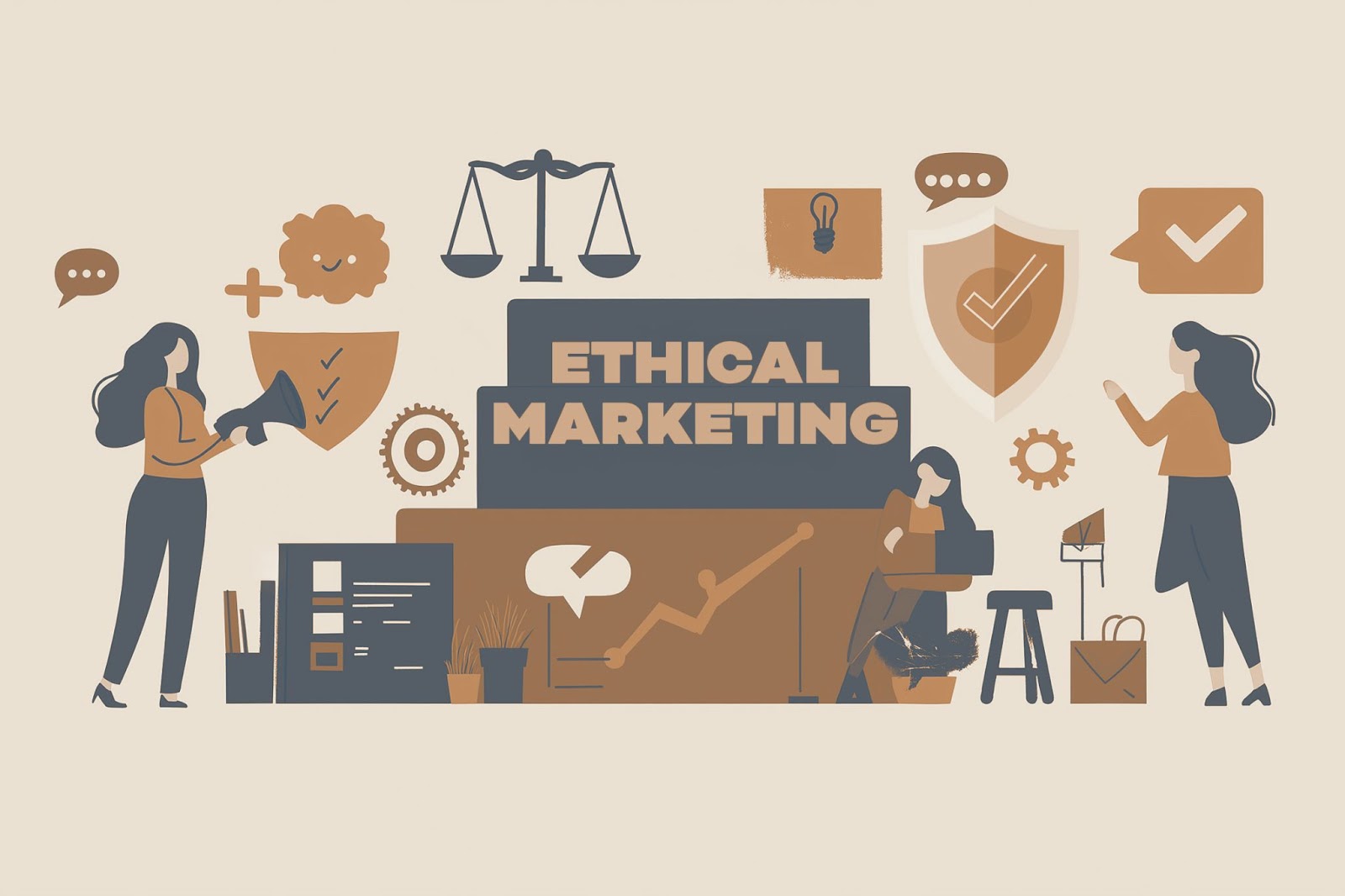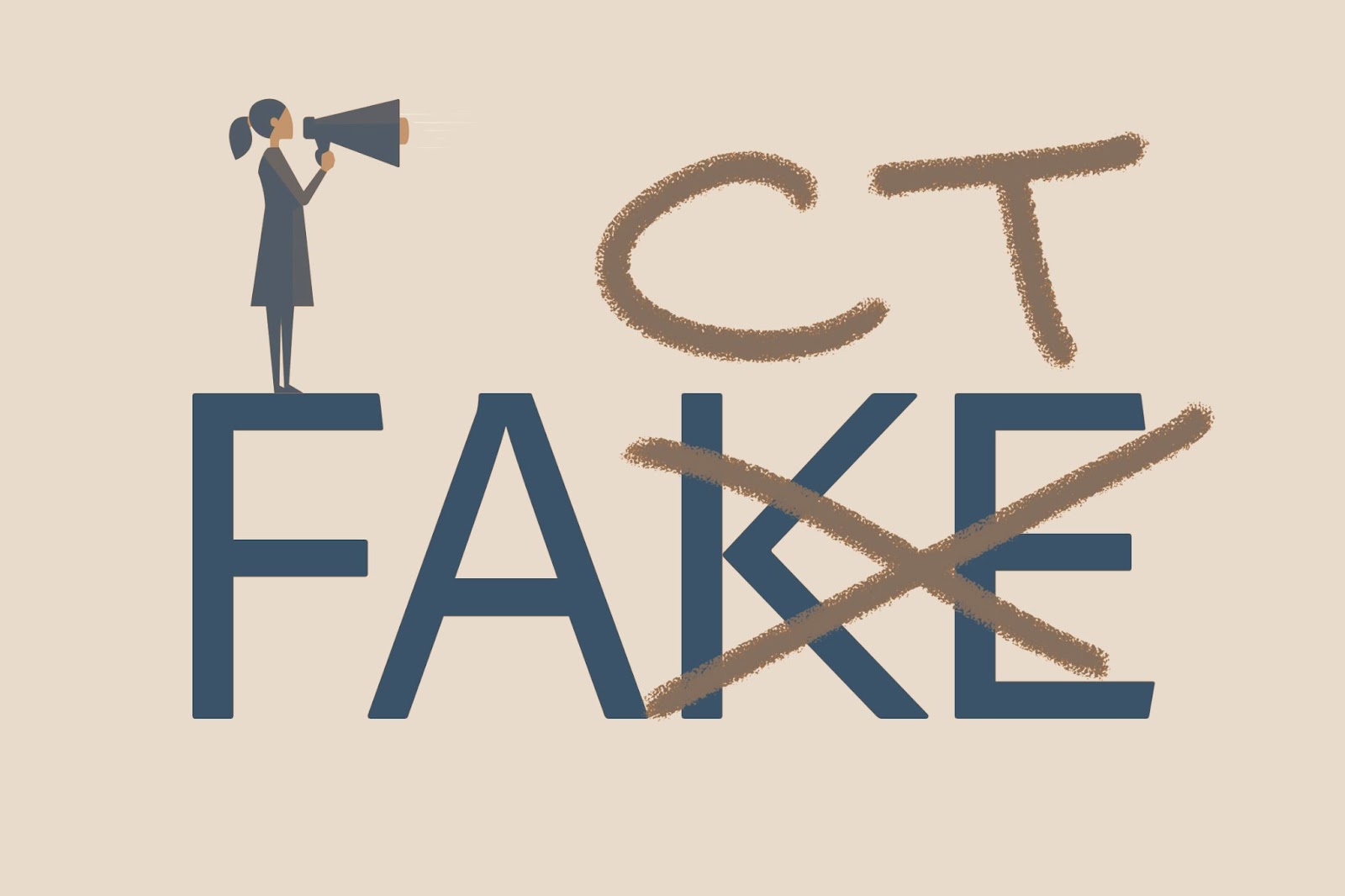Full Guide to Ethical Issues in Marketing: (with Ethical and Legal Insights)
Explore the landscape of ethical issues in marketing along with ethical challenges to work on for building trust.

The marketing world has gotten more complicated lately, while ethical and legal issues have become a much bigger deal, especially if you're in one of those industries with lots of regulations. And about 75% of Americans think companies that stick to ethical marketing practices will probably do better in the long run.
But there's a flip side to this: when companies mess up on the ethics front, it gets expensive. Over 60% of fintech companies had to pay at least $250,000 in compliance fines sometime in the past year.
And then there's the trust factor. I read that nearly two-thirds of consumers (that's 61%) have actually stopped doing business with a company because they didn't like how their data was being handled.
So all these numbers are telling us that doing the right thing in marketing isn't just about feeling good about yourself but actually a smart business move. In this guide we are covering all things you’ll have to consider to make your marketing 100% legal and ethical.
What is Ethical Marketing and Why Does It Matter?

Defining Ethical Marketing
In today's world, ethical marketing means promoting products and services in honest, transparent, and responsible ways. Recent consumer data backs this up: almost half of Americans (48%) describe "ethical marketing" as being truthful, transparent, and upfront in messaging. Others connect it with inclusivity (19%) or responsible professionalism (13%).
Ethical marketing basically means making sure your campaigns match up with moral values - avoiding deception, respecting customer data, and being fair and inclusive. Honesty and transparency came out as the top things consumers expect from ethical marketers.
Why it Matters - Trust and Business Impact
Ethical marketing isn't just about staying out of trouble; it actually helps your brand. Consumers reward ethical behavior. A 2023 McKinsey study found 71% of consumers are more likely to buy from brands they view as transparent and responsible with data.
And according to Edelman's Trust Barometer, when brand trust is established, 59% of consumers will purchase new products and even pay a premium, and 67% will stay loyal and advocate for that brand - even sticking with it during a public misstep.
This trust shows up in performance too: companies known for ethical conduct often do better than their competitors. For example, the "World's Most Ethical Companies" - an annual designation - collectively outpaced the stock market by over 12% over a five-year period. So ethical marketing builds customer trust, which then leads to better sales, more loyalty, and long-term success.
Common Ethical Issues in Marketing

Even as people become more aware of ethical marketing, some problematic practices continue across industries. The main issues include:
Deceptive Advertising
Misleading claims and false advertising are still big concerns. The U.S. Federal Trade Commission (FTC) has been cracking down - in 2023 it sent warning letters to nearly 700 companies about unsubstantiated product claims. The penalties can be severe: in one case, the FTC made Credit Karma pay over $2.5 million in refunds to consumers misled by false "pre-approved" credit offers. These actions show how false claims can hurt your reputation and lead to legal problems.
Privacy Violations
The growth of data-driven marketing has raised serious privacy concerns. 40% of U.S. consumers say they don't trust companies to use their personal data ethically. Data misuse or hidden data collection is considered unethical - and it's bad for business. Most consumers now see privacy as a deal-breaker: 86% say data privacy is a growing concern and 61% have stopped doing business with a brand due to its data practices. Unethical handling of customer data (selling data without permission, too much tracking, etc.) not only breaks regulations but quickly destroys customer trust.
Misleading Digital Tactics
In the digital world, new forms of misleading marketing have appeared. AI-generated content and deepfake ads can fool consumers. Notably, 94% of Americans are worried about some aspect of AI in marketing, with the biggest concern being misleading or deceptive AI-generated content (cited by 39% of respondents).
In a recent survey, 44% of Americans reported seeing AI-generated marketing content, and among those, nearly as many (42%) said it negatively affected their opinion of the brand. Beyond AI, influencers not disclosing sponsorships and fake online reviews are other common ethical issues. Regulators have noticed this trend - for example, the FTC warns that posting undisclosed sponsored content can result in penalties up to $50,000+ per violation. Misleading tactics might give short-term benefits, but they risk legal action and lasting brand damage.
Compliance and Transparency Gaps
Especially in compliance-heavy industries like finance and healthcare, marketers face ethical problems if they leave out required disclosures or target vulnerable groups inappropriately. For instance, financial promotions must not promise unrealistic returns. Yet regulators still find violations - the U.S. SEC recently charged nine investment advisory firms for advertising hypothetical investment performance without proper policies, resulting in $850,000 in combined fines.
In fintech, compliance oversight can be inconsistent: 65% of fintech firms lack compliance monitoring on at least one of their marketing channels, which means important disclosures or fair marketing practices might be missed. These gaps show that ethical problems often happen not just from trying to mislead, but from not having enough oversight or understanding of complex regulations.
Each of these issues - from false ads to privacy breaches - shows why strong ethical standards are needed. Beyond harming consumers, unethical marketing can lead to lawsuits, fines, and lost loyalty. Knowing the common problems is the first step to avoiding them.
How Do Marketing Practices Align with Ethical Standards?

Modern marketers need to navigate a web of laws and guidelines designed to uphold ethics. Key frameworks include:
Data Privacy Laws (GDPR, CCPA)
The EU's General Data Protection Regulation (GDPR) and California Consumer Privacy Act (CCPA) have set strict rules on personal data use in marketing. GDPR, which started in 2018, completely changed how organizations handle data worldwide. It allows regulators to impose fines up to 4% of a company's global revenue for serious violations.
In fact, U.S.-based companies have been caught by these rules - for example, Meta (Facebook) received a record €1.2 billion (~$1.3 billion) GDPR fine in 2023 for unlawful data practices. These laws require transparency (clear privacy policies, opt-outs) and need consumer consent for data collection, aligning marketing with the ethical principles of consent and privacy.
In the U.S., CCPA (and its updated version CPRA) gives California residents rights to know, delete, and prevent the sale of their data, pushing companies toward more ethical data handling. In 2022, California's attorney general imposed a $1.2 million fine on Sephora for CCPA violations - a sign that U.S. authorities are enforcing privacy standards too.
Advertising and FTC Guidelines
To ensure truthful marketing, the Federal Trade Commission publishes guidelines and can enforce against unfair or deceptive ads. All marketing communications in the U.S. must follow Truth-in-Advertising laws (claims must be truthful and evidence-based).
The FTC has also updated its standards to keep up with new media. In mid-2023, it updated its Endorsement Guides to crack down on fake reviews and require clearer disclosure from social media influencers. This means brands and influencers are legally expected to disclose material connections (e.g. payments for promotions) - hiding sponsorships breaks ethical and legal standards.
Similarly, the FTC's Consumer Review Fairness Act protects the posting of honest reviews, making it illegal for companies to prevent consumers from sharing truthful feedback. These regulations align marketing practice with honesty and transparency. Companies that ignore them - for example, by using misleading testimonials or not disclosing influencer partnerships - risk investigations or fines.
Challenges of Digital Marketing in Maintaining Ethical Behavior

The digital era has made marketing capabilities much stronger - but it's also increased ethical challenges. Companies must deal with privacy concerns, data security, and new forms of deception online. Major challenges include:
Privacy and Data Protection
Digital marketing depends heavily on personal data (tracking online behavior, targeting ads, etc.), which can conflict with consumer privacy expectations. Surveys show consumers are increasingly uncomfortable: 68% of Americans are concerned about the amount of personal data companies collect, and an overwhelming 86% say their data privacy is a growing concern.
Every piece of data collected - from cookies to purchase history - raises the question: is it being used responsibly and with consent? When brands go too far (e.g. excessive personalization that feels "creepy" or selling data without permission), they risk backlash. The challenge for marketers is finding the right balance between personalization and privacy. Trust can disappear quickly if people feel spied on.
AI and All That New Tech
So, AI is kind of everywhere in marketing these days - you've got chatbots popping up on websites, personalized emails that somehow know what you looked at yesterday, and even ads that seem to read your mind. But here's the thing - this tech comes with some iffy ethical questions. A poll from earlier this year found that only 37% of Americans feel comfortable with marketers using AI, and a whopping 94% are worried about something going wrong. That's... well, that's a lot of concerned people.
And I don't think they're being paranoid, honestly. We've all seen those deepfake videos that are getting scarily realistic. Plus, these AI systems sometimes pick up weird biases. I was talking to someone in banking last month who discovered their customer targeting algorithm was accidentally excluding certain neighborhoods - yikes! And don't even get me started on that dynamic pricing stuff where AI adjusts prices based on who you are. About half of consumers find that creepy, and I'm definitely in that half. I mean, shouldn't everyone pay the same price?
The problem is that regulations haven't caught up yet. Only about 28% of Americans think current rules are good enough for handling AI in marketing. So right now, it's pretty much up to companies to be responsible - checking for bias, being transparent about when content is AI-generated, and not crossing lines just because they technically can. It's a bit of a wild west situation, if you ask me.
Ensuring Ethical Marketing Practices

Given what's at stake, companies are taking proactive steps to embed ethics and legal compliance into their marketing operations. Here are strategies and real-world examples of how businesses can uphold ethical standards:
Develop a Strong Ethical Framework and Culture
Ethical marketing starts from the top. Companies are establishing clear codes of ethics for marketing and advertising, so teams know the ground rules. This often includes formal policies on truth in advertising, customer privacy, and social responsibility. Training is crucial - marketers are regularly educated on laws and on the company's own values.
Many firms have created an Ethics or Compliance Officer role to review campaigns. For example, in financial services, it's common to have compliance officers check any public-facing content before release, ensuring it meets regulations and ethical standards. An ethical culture also means empowering employees to speak up if something feels wrong.
Organizations with robust ethics programs experience fewer incidents; one survey found 92% of business leaders acknowledge they need to do more to strengthen data protection and ethical safeguards internally, indicating a recognition that culture is key to avoiding missteps.
Transparency and Honesty in Communications
Transparency is a recurring theme in all research on ethical marketing. Brands that are open and honest with consumers build goodwill. In practice, this means full disclosure - of pricing, fees, terms and conditions, sponsorships, and data use. It also means admitting mistakes publicly when they happen.
For instance, some banks and fintech firms have started providing clearer fee breakdowns and straightforward language in their marketing. Chime, a U.S. fintech, grew to over 12 million customers by 2022 in part by marketing itself as a "no hidden fees" transparent banking service, and backing that up with simple, educational content for consumers. This strategy of simplifying finance helped Chime build trust with younger consumers who value openness.
The lesson: transparency isn't just ethical, it's a differentiator. 71% of consumers say they're more likely to support brands that are transparent about their practices, so companies that communicate openly stand to gain customer loyalty.
Implement Compliance Oversight
Ensuring legal compliance in marketing is essential, especially in regulated sectors. Firms are strengthening their oversight through compliance technology and monitoring. For example, many banks and fintechs use automated tools to scan their marketing content for any language that might trigger regulatory issues.
A 2023 industry report noted 65% of fintechs have gaps in monitoring their marketing channels, prompting a push to invest in compliance monitoring solutions. In response, fintech companies are dedicating more budget to compliance - compliance headcount and technology now account for a combined ~76% of fintech compliance spending. The goal is to catch problems before they go public.
Final Thoughts on Why This Actually Matters
So, what's the takeaway from all of this? One thing to mention is that ethical marketing isn't just about doing the right thing but it also can be good for business. Trust is fragile these days. We've all seen how quickly things can go south on social media when a company messes up. And regulators are definitely paying more attention than they used to. So marketing compliance can't just be this afterthought, it has to be baked into what you're doing from the start. This is especially true if you're in one of those highly regulated industries — finance, healthcare, insurance, etc..
Here at Luthor we don't think compliance and creativity have to be enemies. Our AI tool (which we built after seeing how stressed out marketing teams get trying to handle compliance manually) helps in a few ways:
- It automatically checks your marketing stuff for compliance issues. And I don't just mean a basic scan - it actually looks for the nuanced problems that might get flagged by regulators.
- It cuts down the risk of those nasty penalties and the reputation damage that comes with them. Because let's face it, nobody wants to be that company in the news for misleading customers.
- You'll save a bunch of time on reviews since potential issues get caught early. (I remember working at a financial company years back where we'd sometimes spend weeks going back and forth with legal - it was a nightmare!)
- And maybe best of all, you can scale up your marketing without having to hire a whole compliance department. We've had clients who were able to double their campaign output without adding any compliance staff.
By taking care of the compliance headaches, creative people can focus on what they're actually good at - making great campaigns that connect with your audience. Not stressing about whether they've included all the right disclaimers in the right font size.
If that sounds familiar, maybe give Luthor a try? We'd be happy to show you how it works. No pressure - just request a demo and we'll walk you through it. We're helping quite a few marketing and compliance teams work better together, and we'd love to do the same for you.